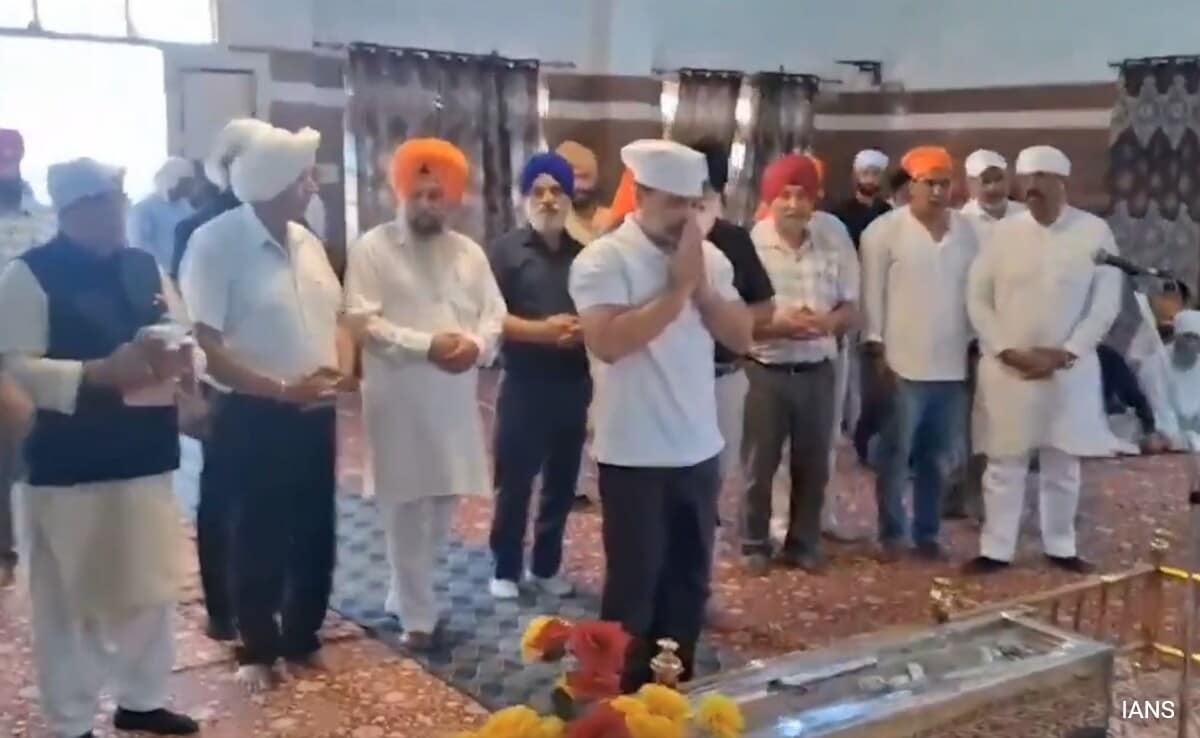Poonch Gurdwara Visit Highlights Resilience in Face of Adversity
In a poignant show of solidarity, Rahul Gandhi, the Leader of the Opposition in India’s Lok Sabha and prominent Congress MP, visited the Gurdwara Sri Guru Singh Sabha in the Poonch district of Jammu and Kashmir on May 24, 2025. This religious site had recently come under fire during a wave of Pakistani shelling that left a devastating mark on the local community. The visit comes in the wake of escalating border tensions between India and Pakistan, particularly heightened following India’s Operation Sindoor that targeted militant sites across the border.
During his visit, Gandhi radiated a message of unity and resilience. He was seen in his signature white shirt, offering prayers and condolences at the gurdwara, which serves as a testament to the communal harmony that has long been a hallmark of the region. In posts shared on social media platform X (formerly Twitter), he expressed his sorrow over the loss of lives due to shelling, particularly mentioning the tragic death of two young students, Zain Ali and Urwa Fatima. His visit was not merely ceremonial; it was a heartfelt engagement with the community that has suffered tremendously in recent weeks.
The backdrop of this visit is chilling. Between May 7 and 10, Poonch experienced some of the worst shelling in recent memory as 13 civilians, including young children, tragically lost their lives. This episode has drawn widespread condemnation and concern regarding the safety and stability of the region. Notably, since April 22, following a terror attack in Pahalgam that claimed the lives of 26 individuals, tensions have surged, forcing local leaders to confront the grim realities of violence and loss impacting their constituents.
Gandhi’s Engagement with Affected Families and Community
Gandhi’s visit was marked by a series of meetings with bereaved families and local residents affected by the recent violence and destruction. Upon arriving at the Jammu airport and taking a helicopter to Poonch, he quickly made his way to the most severely impacted areas, where he met families who have lost loved ones and inspected the damages to homes and local establishments. His interactions were characterized by empathy, as he listened to the stories of loss and resilience from community members.
In one touching moment captured on camera, Gandhi spoke with school children who were mourning their lost friends. He encouraged them to “study hard, play hard and make lots of friends,” reminding them that hope prevails even in dire situations. His reassurance to the children that “everything will come back to normal” reflected his desire to instill strength and courage during these trying times.
Furthermore, during his visit, the local residents sought Gandhi’s assistance in addressing the pressing issue of compensation for their damaged properties. Many expressed their concerns over the inadequate support from authorities, underscoring the urgent need for governmental intervention to ensure that families can rebuild their lives and communities.
Political Context and Background of Rising Tensions
The broader geopolitical context cannot be overlooked in this scenario. The recent escalation of violence has roots in longstanding issues between India and Pakistan regarding territorial claims and militant activity in the region. Following the Pahalgam terror attack, the Indian government launched Operation Sindoor, which involved targeting nine suspected terrorist sites in Pakistan and Pakistan-occupied Kashmir in response to mounting security threats. This military operation has been a point of contention, raising fears of further violence in an already volatile area.
Gandhi’s visit and the sentiments he expressed resonate deeply in a region where communal harmony has been painstakingly upheld over the years. The historical coexistence of diverse faiths and identities in Poonch is a crucial element of its social fabric, and efforts to maintain this unity are essential, especially during times of crisis. He emphasized the importance of solidarity and mutual support amid the devastation, stating that “every religion lives together, sharing sorrow together.” This message is critical in countering divisive sentiments that may arise in the aftermath of violence and tragedy.
A Call for Strengthening Community Bonds
While the tragic circumstances brought about by violence and international tensions understandably dominate the narrative, Gandhi’s visit serves as a reminder of the larger need for community healing and resilience. He highlighted that the spirit of Poonch, characterized by “harmony, unity, and patriotism,” must prevail against those attempting to sow discord and division. The sights of broken homes, scattered belongings, and grieving families reflect the harsh reality of conflict; however, the strength displayed by these families showcases the undying spirit of the community.
The emotional toll on the residents of Poonch is immense, and the repercussions of violence extend far beyond physical destruction. Mental health and community well-being necessitate a robust response from both local political leaders and central authorities to ensure that those affected receive adequate emotional and psychological support.
In a time where news of violence dominates headlines, Gandhi’s visit stands as a crucial reaffirmation of the need for compassion and collective resilience. It encapsulates not just a political response but a humane approach that seeks to bridge divides, heal wounds, and foster a greater understanding among the people of Poonch.
To keep abreast of the latest updates on this developing story, you can refer to external sources such as[The Hindustan Times](https://www.hindustantimes.com/) and[The Indian Express](https://indianexpress.com/).
DISCLAIMER
We have taken every measure to ensure that the information in this article and on our social media platforms is accurate, verified, and obtained from reliable sources. For feedback or complaints, please contact us at info@hamslive.com.


